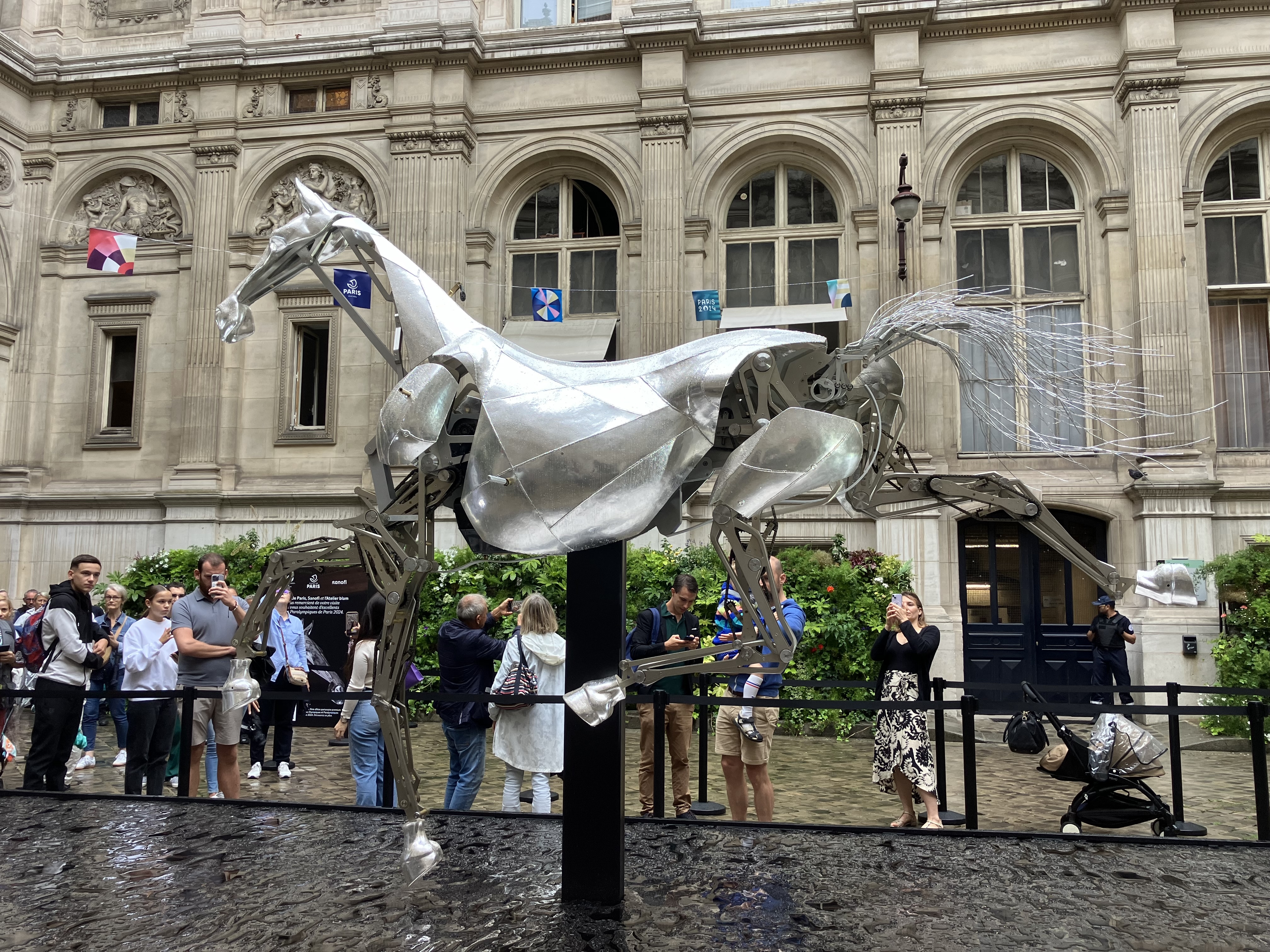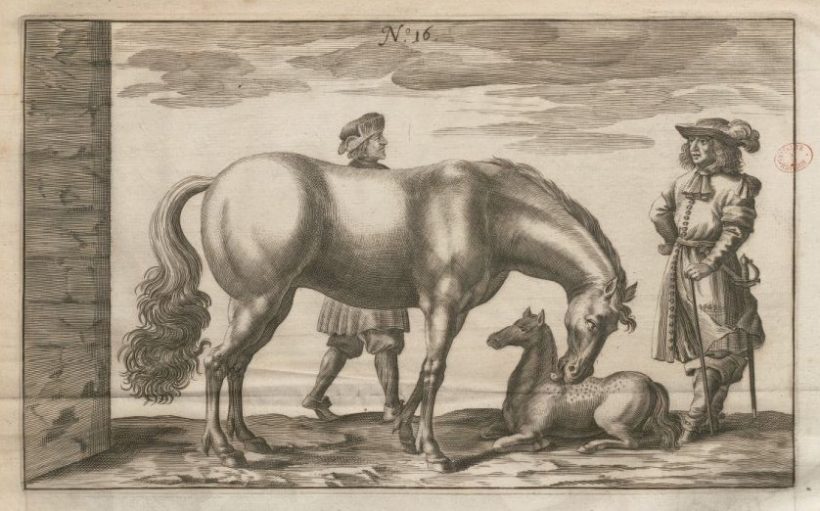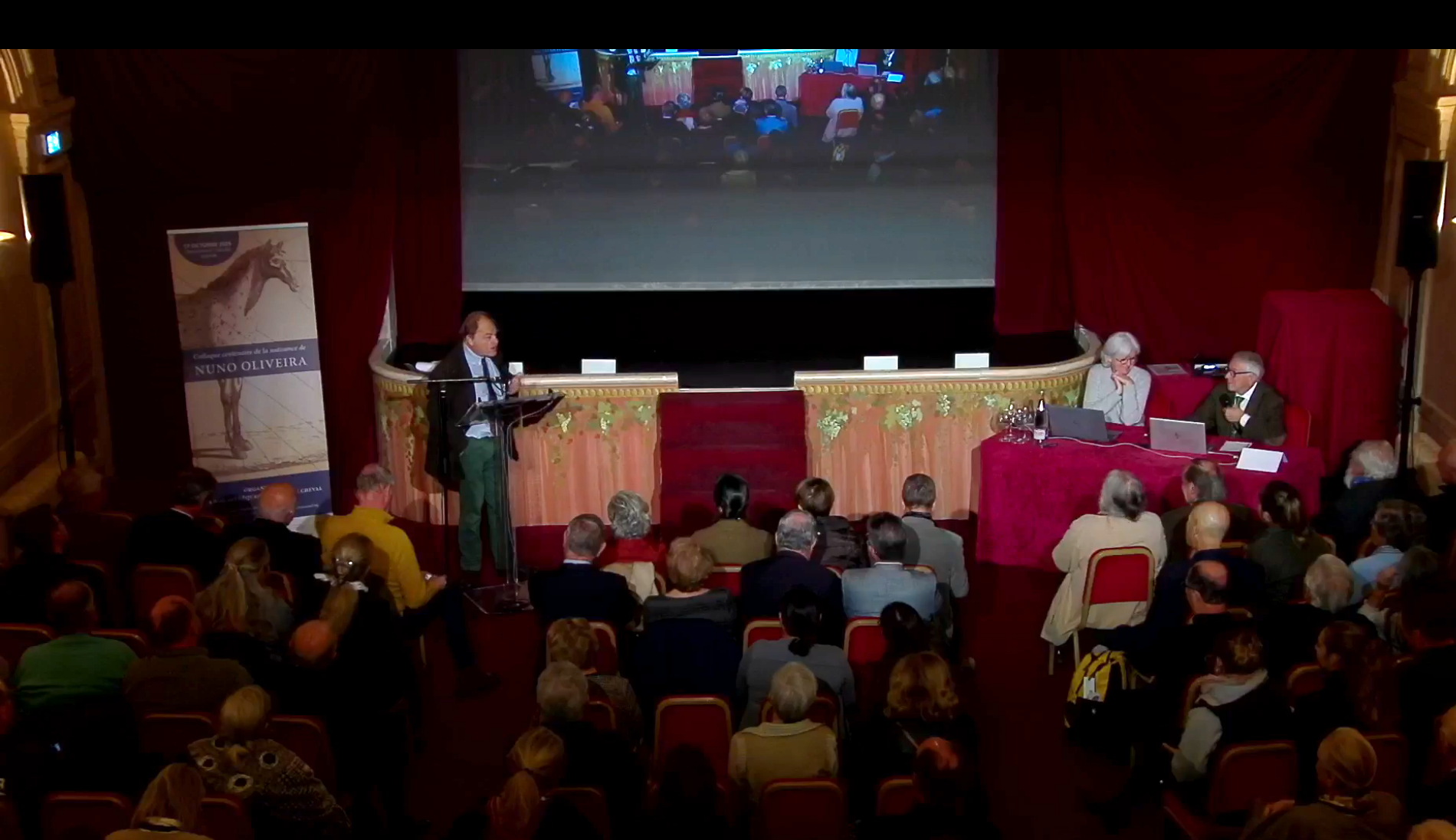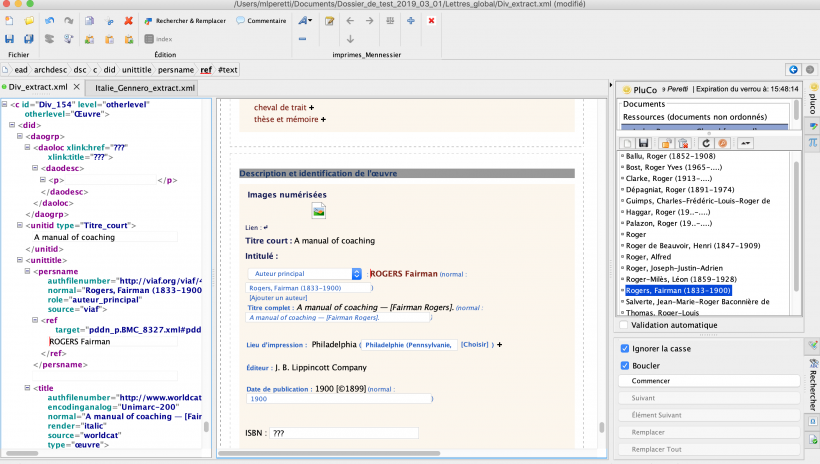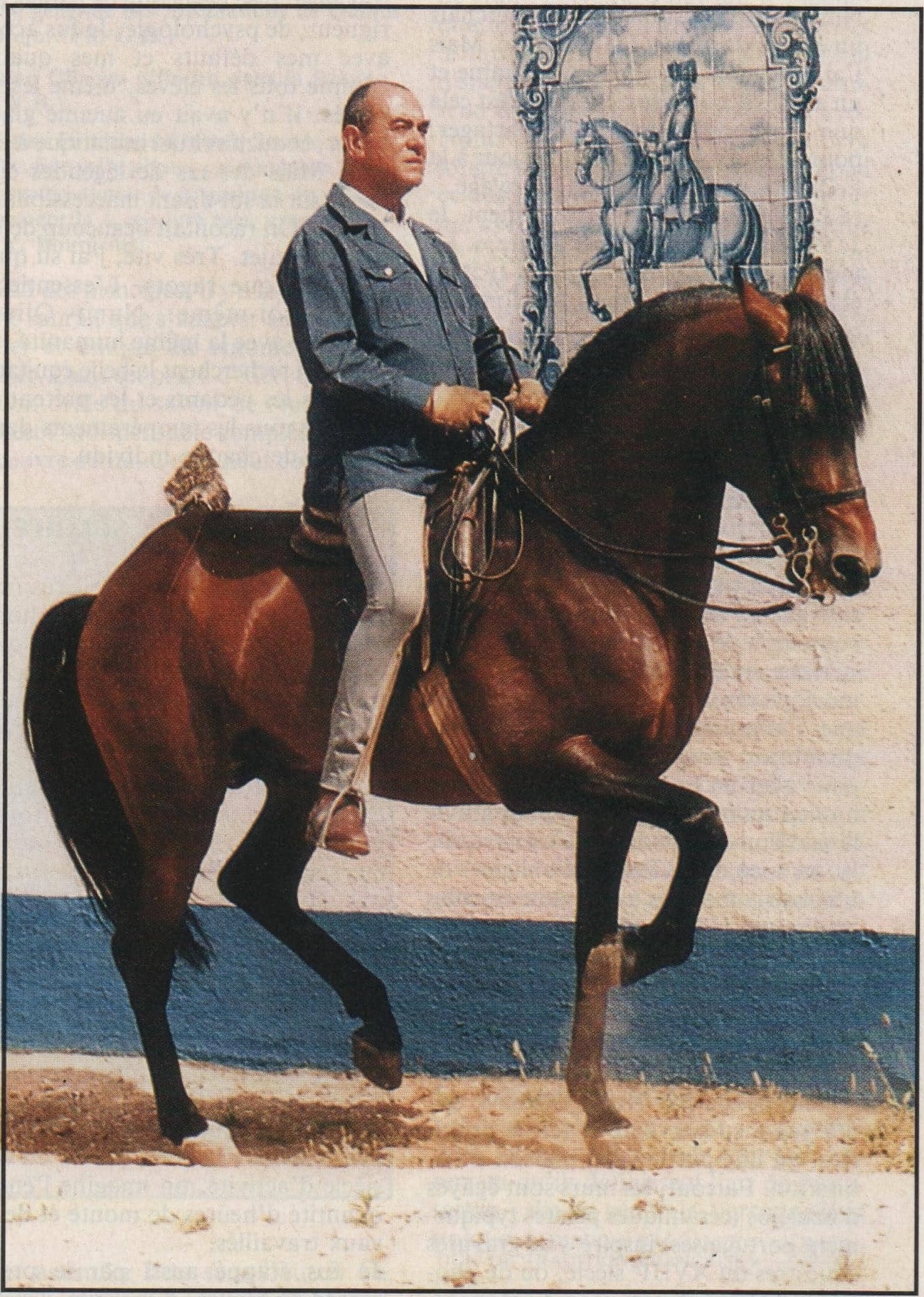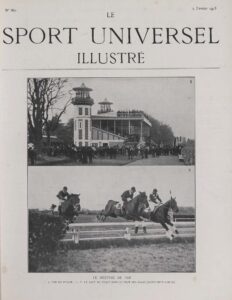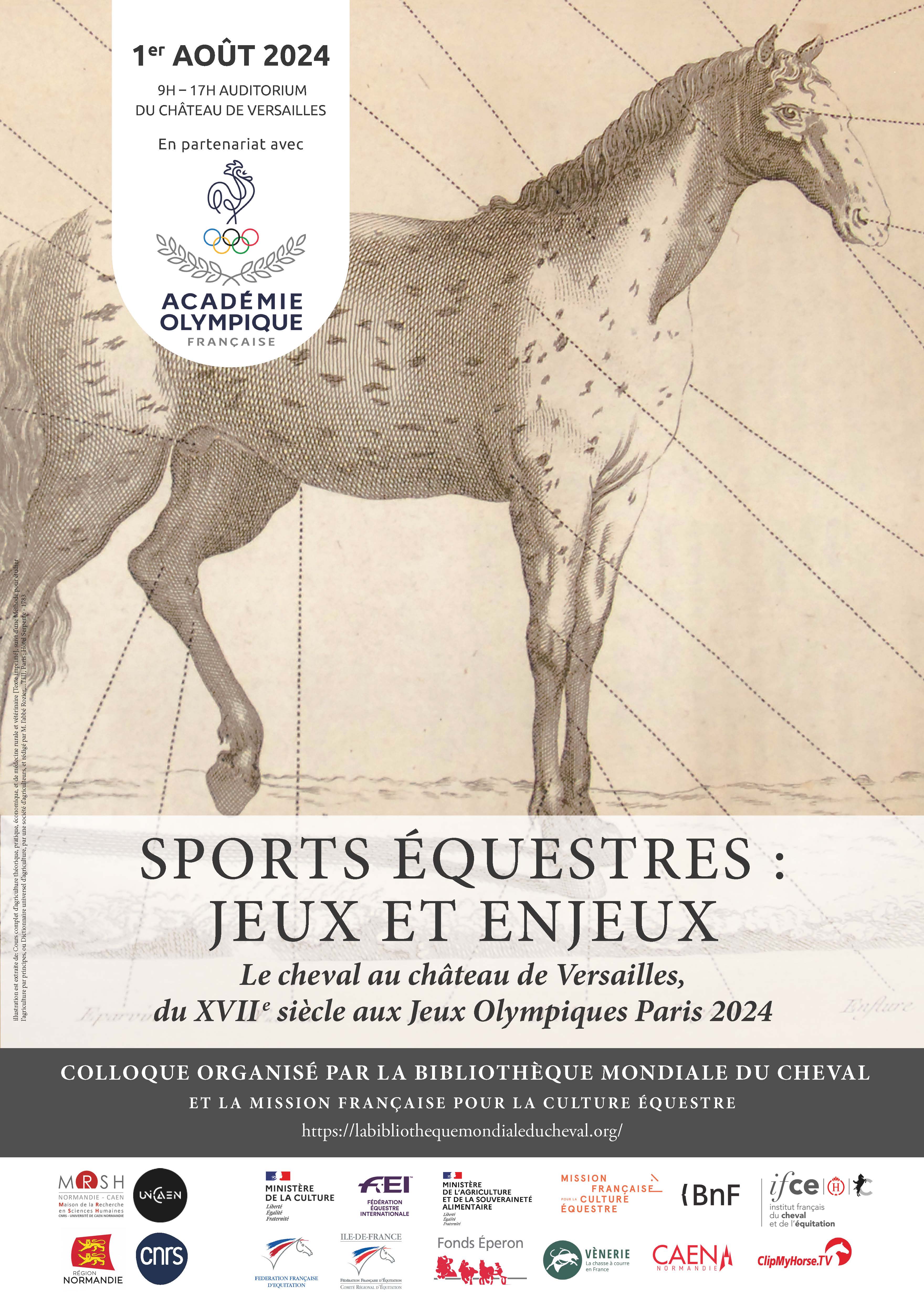
Conference — “Equestrian sports: Games and challenges”
The horse at the Palace of Versailles from the 17th century to the Paris 2024 Olympic Games
World Horse Library Conference, August 1, 2024, Château de Versailles.
Program
Morning (9:00 a.m.)
Opening of the conference by Ingmar de Vos, President of the International Equestrian Federation (FEI), and Pascal Buléon, Director of the Maison de la recherche en sciences humains (MRSH) at the University of Caen, which is developing the World Horse Library.
- The horse and the Palace of Versailles: three centuries of shared history
A constituent element of the creation of the Versailles estate under Louis XIII and Louis XIV, the horse was omnipresent at court throughout the Ancien Régime: an auxiliary for royal hunts, for gallant walks in the park, and an attribute of power in ceremonial moments. Its mark, beyond the majestic Grande and Petite Écuries du roi, masterpieces by Jules Hardouin-Mansart, dots the artistic decor of the château's apartments and gardens. The success of this alliance between horse and monarchy explains the persistence of policies in later periods, whatever the regimes: the story of an eternal return of the horse, between the desire to refer to the glorious era and adaptation to contemporaneity.
Karine Mc Grath, historian and head of the archives department of the Château de Versailles.
Followed by a presentation by Pierre-François Prioux, president of the Société de Vénerie.
- Horse riding at Versailles from the 17th century to the present day, characteristics and developments
In the 17th century, the Versailles School marked the "apogee of horse riding" (L'Hotte) and symbolized excellence, considered today as one of the finest currents of traditional French horse riding. It is in this privileged place that the almost definitive rules that will govern the equestrian art will be established, then spread. A host of riders will seek "perfection" there: that the horse can find, under the saddle, the lightness and grace that it naturally possesses.
Guillaume Henry: riding instructor, publisher, horse historian and writer.
- Dressage at the Olympic Games, an evolution for which General Decarpentry laid the foundations. Views.
By creating the project of modern Olympism, Baron de Coubertin gave a place to horse riding, and to dressage in particular. The regulations have evolved towards their contemporary form involving the academic expertise of General Decarpentry, adapting to the reality of international confrontations, which have become civil and mixed, developing the spirit and techniques, not without debates between tradition and progress, particularly in breeding. Beyond the Olympics, horse riding now affects all audiences, while the challenges of such development alert us to the need to control its growth.
Alain Francqueville, former equerry of the Cadre Noir. President of the Mission for Equestrian Culture.
Afternoon (2:00 p.m.)
- Pierre de Coubertin and the great Olympic riding school (1894-1924)
Already on the program in Antiquity, equestrian sports were planned for the renovated Olympic Games in Athens in 1896. However, they experienced chaotic beginnings until 1912 (Arthur Gallois). The link between equestrian sports and the Olympics has its source in the personality of Baron Pierre de Coubertin (1863-1937), whose project consisted of forming a modern knighthood, the "sportsmen" (Patrick Clastres). Author of a treatise on equestrian fencing and inventor of the modern pentathlon, Coubertin has published on the horse or in reference, even metaphorically, to the animal (Arnaud Richard and Carine Duteil).
Arthur Gallois: PhD student (Unil/Paris 1) in contemporary history and research fellow at the French National Olympic and Sports Committee (CNOSF).
Patrick Clastres: Professor at the Faculty of Social and Political Sciences at the University of Lausanne (Unil), Director of the Centre for Olympic Studies & the Globalisation of Sport at Unil.
Arnaud Richard: University professor in language sciences at the University of Toulon and President of the French National Olympic Academy (ANOF).
Carine Duteil: HDR lecturer in language sciences at the University of Limoges, member of the French National Olympic Academy (ANOF).
Followed by a video projection on Blanche de Marcigny, the first French Olympic rider at the 1900 Paris Olympic Games. (Stéphane Gachet and Erwan Mellec, 7 min).
Photo panorama of equestrian sports at the 1924 Paris Olympic Games.
- Mixed equestrian sports: an asset for the International Olympic Committee (IOC)?
Mixed equestrian sports, unique in the Olympic Games program, echoes the contemporary challenges of a society in search of gender equality. However, mixed equestrian sports do not necessarily mean, depending on the disciplines (dressage, eventing, show jumping), parity and equality in the quest for success. This analysis aims to better understand the complexity of the situation and its major challenges, questioning the place of women in this unique sport and the advantage that the Olympic Games can take from it.
Sylvine Pickel-Chevalier, university professor, geographer, ESTHUA, University of Angers.
- Horse riding at the Olympic Games, between humanism and "animalism"
Horse riding, the only sport on the Olympic program to be practiced with and on an equal footing with an animal: in the face of a rapidly changing society and "animalist" criticism, does this singularity not, on the contrary, demonstrate a degree of humanism, a value specific to the Olympic movement, and therefore an argument for the indisputable maintenance of horse riding in the latter's program?
Jean-Pierre Digard, emeritus research director at the CNRS, member of the French Academy of Agriculture.
Followed by a testimony from Pierre Durand (Olympic show jumping champion in Seoul in 1988).
- Conclusion
Xavier Libbrecht, journalist, project manager of the World Horse Library, MRSH/University of Caen. Closing speeches by Serge Lecomte, president of the French Equestrian Federation (FFE), and Hervé Morin, president of the Normandy region, which supports the World Horse Library.
PROGRAMME TROMBINOSCOPE
Broadcast
The conference will be broadcast live on this page, the FFE YouTube channel, on the Clip My Horse website and on the World Horse Library Facebook page
